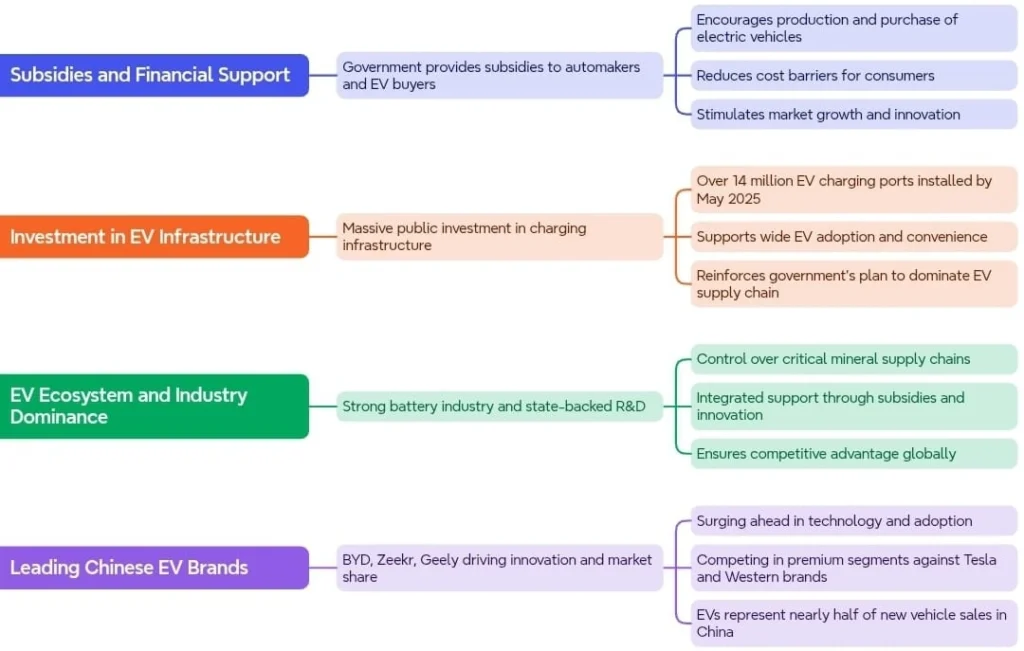Paper: GS – II, Subject: International Relations, Topic: Global issues, Issue: China’s strategy towards U.S.
Context:
China has strategically reduced its dependence on oil, particularly foreign oil, through a massive shift towards electric vehicles (EVs). This transition also dilutes U.S. geopolitical leverage over China via oil-related sanctions or supply disruptions.
Key Highlights:
China’s Oil Dependency Problem:
- Import dependence: China has long been the world’s top oil importer and second-largest oil consumer.
- Economic vulnerability: Overdependence on foreign oil was seen as a strategic vulnerability, particularly in the face of potential U.S.-led disruptions.
China’s Response: Transition to EVs: China undertook a national push to reduce oil dependency, promote energy self-sufficiency and lead the global EV market as part of industrial and security policy.
Xi Jinping’s Vision: Xi declared that “the energy security lever must be held in our own hands” which aligns with China’s broader push for technological self-reliance and de-risking from Western pressure points.
Measures undertaken by China:

Implications of China’s E.V push:
- Blunting U.S. Leverage: The U.S. has often used oil-related sanctions as tools of coercion (e.g., against Iran, Russia). By reducing oil dependency, China blunts this pressure point.
- Influencing Global Oi l Demand: Chinese demand had long propped up global oil prices. With reduced consumption growth, the global oil market faces realignment, which affects major exporters like Saudi Arabia, Russia).
- Strategic Autonomy: China’s reduced reliance on the U.S. dollar-based oil trade limits strategic advantage enjoyed by Washington so far.
- Self–reliance: EV push can ensure broader national security and energy independence.
- Negative reaction by U.S: U.S. officials now view China’s clean tech push as a strategic threat in energy and manufacturing. Beijing’s proactive stance contrasts with U.S. delays in EV adoption and infrastructure.
- Carbon neutrality: Transition to EVs also helps reduce emissions and supports climate commitments. It aligns with China’s goal of carbon neutrality by 2060.
Conclusion:
China’s shift from oil dependence to EV dominance reshapes global energy markets, limits U.S. leverage, and positions China as a leader in clean technology and energy security. It underscores the importance of India to accelerate its own EV transition and reducing fossil fuel dependency to build strategic autonomy.
La Excellence IAS Academy, the best IAS coaching in Hyderabad, known for delivering quality content and conceptual clarity for UPSC 2025 preparation.
FOLLOW US ON:
◉ YouTube : https://www.youtube.com/@CivilsPrepTeam
◉ Facebook: https://www.facebook.com/LaExcellenceIAS
◉ Instagram: https://www.instagram.com/laexcellenceiasacademy/
GET IN TOUCH:
Contact us at info@laex.in, https://laex.in/contact-us/
or Call us @ +91 9052 29 2929, +91 9052 99 2929, +91 9154 24 2140
OUR BRANCHES:
Head Office: H No: 1-10-225A, Beside AEVA Fertility Center, Ashok Nagar Extension, VV Giri Nagar, Ashok Nagar, Hyderabad, 500020
Madhapur: Flat no: 301, survey no 58-60, Guttala begumpet Madhapur metro pillar: 1524, Rangareddy Hyderabad, Telangana 500081
Bangalore: Plot No: 99, 2nd floor, 80 Feet Road, Beside Poorvika Mobiles, Chandra Layout, Attiguppe, Near Vijaya Nagara, Bengaluru, 560040
